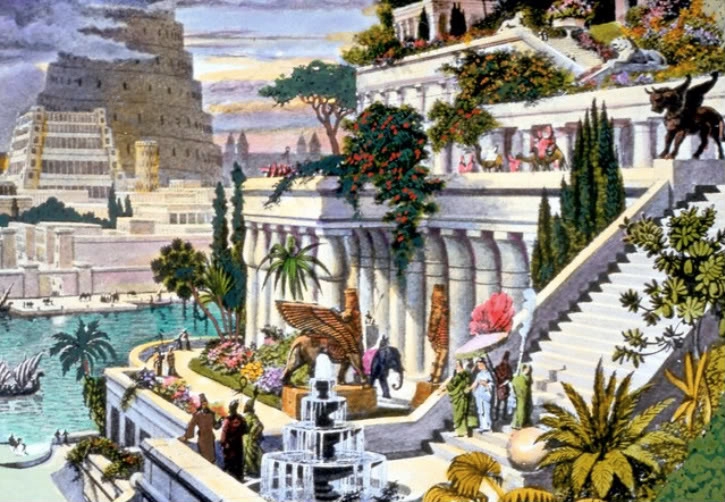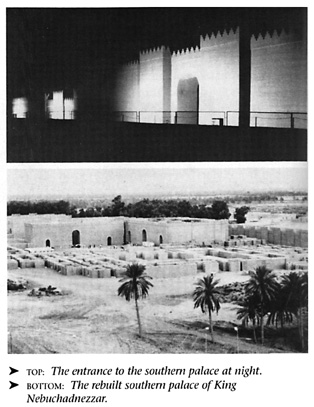Revelation 17 and 18
 |
| The hanging Gardens of Babylon Wikipedia.com |
Rev 14:8 And another, a second angel, followed, exclaiming, "Great Babylon has fallen, has fallen--she who made all the nations drink the wine of the anger provoked by her fornication."
Babylon
Here is the first mention of Babylon found in this book. Some suggest that “Babylon” should not be understood in a literal sense, but as denoting a spiritual location describing the centers of commercial success and sin attending each age of history (Rev. Rev. 17:5+). Some see “Babylon”as a code word for the city of Rome. Some believe “Babylon” means Jerusalem. Others are unsure what it means, or that its identification is important. It is our view that “Babylon” describes the literal city of history on the banks of the Euphrates River, originating with the kingdom of Babel established by Nimrod (Gen. Gen. 10:8-10). The city has had great influence throughout history, both in political and religious realms, and is to be rebuilt in the time of the end and to ultimately suffer God’s wrath. Biblestudytools.com
Rev 16:18 And voices and thunders and lightnings occurred. And there was a great earthquake, such as has not been since men were on the earth, so mighty and so great an earthquake.
Rev 16:19 And the great city came to be into three parts, and the cities of the nations fell. And great Babylon was remembered before God, to give to her the cup of the wine of the anger of His wrath.
Babylon - This is the first time that the word “Babylon” occurs in this book, though it is repeatedly mentioned afterward, Rev_16:19; Rev_17:5; Rev_18:2, Rev_18:10, Rev_18:21. In reference to the literal Babylon, the word is used, in the New Testament, in Mat_1:11-13; Act_7:43; 1Pe_5:13. See Intro. to 1 Peter, section 2. Babylon was a well-known city on the Euphrates (for a full description of which see the notes on Isaiah, analysis of chapters 13 and 14), and was, in the days of its pride and glory, the head of the pagan world. In reference to the meaning of the word in this place, it may be remarked:
(1) That the general characteristics of Babylon were, that it was proud, haughty, insolent, oppressive. It was chiefly known and remembered by the Hebrew people as a power that had invaded the Holy Land; that had reduced its capital and temple to ruins; that had destroyed the independence of their country, subjecting it to the condition of a province, and that had carried away the inhabitants into a long and painful captivity. It became, therefore, the emblem of all that was haughty and oppressive, and especially of all that persecuted the church of God.
(2) the word must be used here to denote some power that resembled the ancient and literal Babylon in these characteristics. The literal Babylon was no more; but the name might be properly used to denote a similar power. We are to seek, therefore, in the application of this, for some power that had the same general characteristics which the literal Babylon had.
(3) in inquiring, then, what is referred to here by the word “Babylon,” we may remark:
(a) that it could not be the literal Babylon on the Euphrates, for the whole representation here is of something future, and the literal Babylon had long since disappeared, never, according to the prophecies, to be rebuilt. See the notes on Isa_13:20-22.
 (b) All the circumstances require us to understand this of Rome, at some period of its history: for Rome, like Babylon, was the seat of empire, and the head of the pagan world; Rome was characterized by many of the same attributes as Babylon, being arrogant, proud, oppressive; Rome, like Babylon, was distinguished for its conquests, and for the fact that it made all other nations subject to its control; Rome had been, like Babylon, a desolating power, having destroyed the capital of the Holy Land, and burnt its beautiful temple, and reduced the country to a province. Rome, like Babylon of old, was the most formidable power with which the church had to contend. Barnes Notes
(b) All the circumstances require us to understand this of Rome, at some period of its history: for Rome, like Babylon, was the seat of empire, and the head of the pagan world; Rome was characterized by many of the same attributes as Babylon, being arrogant, proud, oppressive; Rome, like Babylon, was distinguished for its conquests, and for the fact that it made all other nations subject to its control; Rome had been, like Babylon, a desolating power, having destroyed the capital of the Holy Land, and burnt its beautiful temple, and reduced the country to a province. Rome, like Babylon of old, was the most formidable power with which the church had to contend. Barnes Notes
Rev 18:1 And after these things I saw another angel come down from Heaven, having great authority. And the earth was lighted up from his glory.
Rev 18:2 And he cried mightily with a strong voice, saying, Babylon the great has fallen, has fallen! And it has become the dwelling-place of demons, and a prison of every unclean spirit, and a cage of every unclean bird which has been hated, WNT
 |
| Ishatar gate, Bab ylon |
Babylon in Iraq is one of the most famous archaeological sites in the world. A Mesopotamian capital that flourished for centuries, it was home to Hammurabi (1792-1750 B.C.) who introduced the world’s first known set of laws, and Nebuchadnezzar (604-562 B.C.) who built the famed Hanging Gardens of Babylon.
Time has taken its toll, and so has the modern world. Saddam Hussein decided to rebuild Babylon with modern bricks inscribed with his name, right atop the original walls.
Then came the war to topple him. An American military base was established at Babylon that was soon taken over by Polish troops. A British Museum report on damage to Babylon states that large areas of the site were leveled in order to make a parking lot, roads and areas for tents and bunkers.
Trenches were also dug to give protection to the soldiers. Many of the countless sandbags around the base were filled with soil from the archaeological site. The Ishtar Gate, shown here in this Wikimedia Commons image, suffered significant damage.
Now saline water is leaching into the area, eroding the ancient brick, and three oil pipelines pass right through Babylon.
Despite this, Iraqi archaeologists are applying to get Babylon on UNESCO’s World Heritage List. Because of the extensive damage to the site and Saddam’s “reconstruction,” UNESCO has turned down previous applications – twice.
Now Iraq is trying a new tactic. The proposal now includes the historical significance of the Saddam and Coalition eras. Babylon saw many periods of occupation, after all, and these are the two latest. It’s an interesting tactic and if it works, Babylon would attract more serious efforts from the Iraqi and other governments to preserve one of humanity’s great ancient cities.<http://gadling.com/tag/babylon/>
I do not think the Great Babylon mentioned in the Book of Revelation is literally in Iraq -- I've been taught it is Rome. Your thoughts?
A. Scripture teaches that Babylon is actually two entities intertwined in Chapters 17 and 18. The first Babylon is a literal, physical place during the time of Tribulation from where the Antichrist rules. The second Babylon is the Harlot, a religious system the Antichrist uses to control the world in the last days.
Scripture distinguishes between two Babylons in the end times, the place and the religious system, which are two sides of the same coin. The Bible calls the religious system led by the False Prophet "Babylon," while the world headquarters of the religion's False Prophet is located in the geographical Babylon, which is also the Antichrist’s capital city.www.versebyverseministry.org/images/uploads/babylon

No comments:
Post a Comment